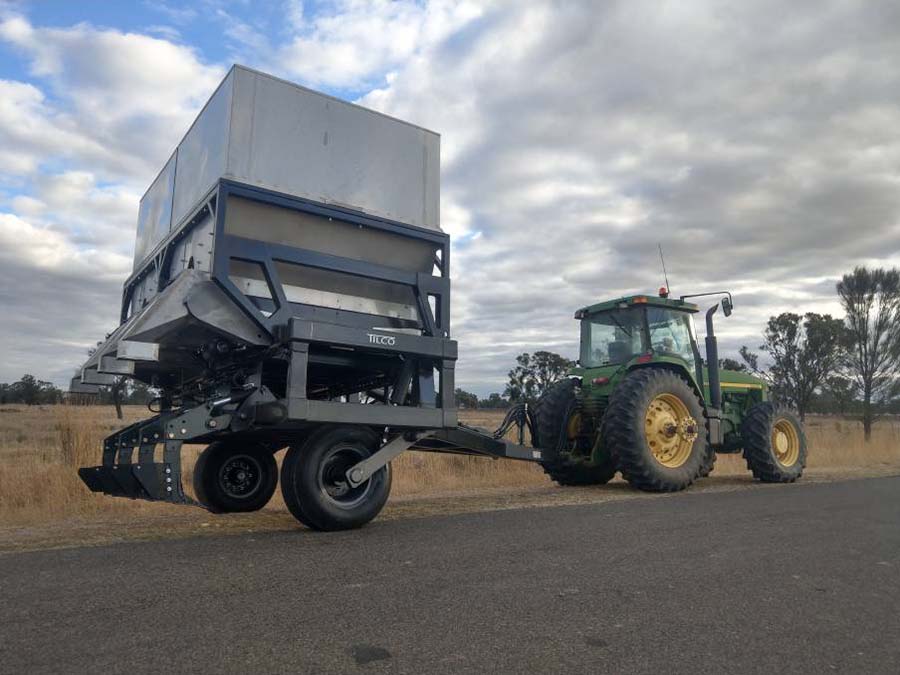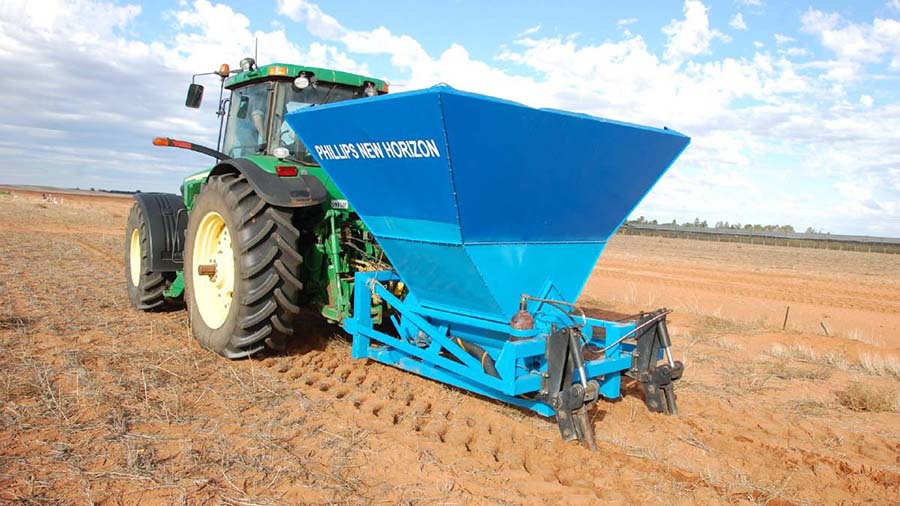Key points
- Researcher, manufacturer and grower collaborations bring insights to machinery solutions for alleviating soil constraints.
- Due to Australia's widely varying soil constraints, machinery needs to be designed locally.
- Interest is growing in manures, composts and on-farm biomass as subsoil constraint amendments.
Developing effective machinery to remedy subsoil constraints requires a systematic, collaborative process from user to manufacturer, guided by best-practice agronomy.
This was a key recommendation from a 2017 subsoil amelioration machinery workshop, organised as part of a large GRDC subsoil amelioration investment across the southern region, led by Dr Roger Armstrong from Agriculture Victoria.
The investment builds on previous research showing long-lasting improvements in soil structure and crop productivity from nutrient-rich organic surface and subsurface amendments, such as manures and composts, as well as other traditional treatments such as gypsum, when applied into sodic subsoils.
However, grower adoption of these practices has been slow, due to economic and practical barriers such as the lack of suitable machinery for cost-effective application.
To address this limitation, 41 participants were brought together for a workshop to identify gaps and opportunities in machinery R&D to assist with improving the availability of reliable and cost-effective subsoil amelioration technologies, with a focus on organic amendments.
Participants included scientists, agronomists, researchers, manufacturers, agricultural engineers and farmers.
Co-convenor Dr Jack Desbiolles, from the University of South Australia, says the workshop highlighted the large variability in the performance of existing subsoil-improving machinery across environments, often leading to poor outcomes.
"Integrated subsoil manuring machinery exists at a small scale for mostly research use. In contrast, there are a multitude of field-ready commercial implements that can offer part solutions, such as deep tillage or crop biomass handling. The challenge is adapting and integrating relevant technologies into cost-effective solutions, without having to redesign the whole wheel," Dr Desbiolles says.
Through a facilitated process, the workshop participants identified several requirements for engineering remedies. These included:
- hopper designs supporting bridging-free operations for selected ameliorant(s);
- consistent ameliorant properties;
- reliable product metering (that is, easily calibrated and adjusted machines);
- flexible control over product placement (for example, banding or dispersal);
- efficient power use to achieve penetration in hard soils and maximise work rate;
- versatility in being able to deliver a range of product forms (either solid, liquid or in situ biomass);
- ability to deal with a variety of paddock issues (for example, handling surface residue, conserving moisture and ensuring seeder-ready conditions); and
- ability to be integrated into various systems (for example, controlled traffic systems).
"The combination of hopper-based delivery systems and unprocessed amendments has been a key contributor to unreliable machine performance and low work rates, reducing the potential for adoption on broad-acre scales," Dr Desbiolles says.
"Opportunities exist to rethink and optimise current approaches, such as surface application of product followed by active inclusion, and ripping being based on adapting existing mainstream technologies as a cost-saving scenario."
The workshop also highlighted innovations, though still at proof-of-concept stage, such as the macerating extruder pump technology (see Figure 3), which is able to mix and apply any form of organic material behind ripping tynes. This was primarily developed for horticultural applications.
"Of course, the case for investing into engineering remedies must be led by strong agronomic evidence supporting best-practice amelioration processes," Dr Desbiolles says.
Grower perceptions
Grower James Hawkins, from Neuarpurr in Victoria, was one of the R&D workshop participants.

Example of hopper-based subsoil manuring machinery now appearing at a commercial scale (4 to 6m wide). The modular hopper approach allows an autonomy of up to 0.25ha per tyne at a standard 10t/ha application rate. Image: Tilco Ag Systems
He is part of a diverse family business encompassing irrigated small seeds and pig production. The enterprise produces 2000 tonnes of compost annually, which is used on-farm to improve soil health.
Mr Hawkins had observed his crops under-performing and confirmed this through interrogating CSIRO's 'Yield Gap Australia' tool, which uses published yield data and modelling to determine the gap between average grain yield performance and rain-fed yield potential. For the West Wimmera region, where Mr Hawkins farms, the yield gap is 41 per cent.
"Due to shallow topsoil and hostile subsoils, we are experiencing waterlogging, even in relatively low rainfall areas, exhausting plant-available stored soil moisture in spring as evapotranspiration exceeds rainfall, and plant performance is compromised by shallow roots," he says.
Acknowledging that subsoil constraints are complex and challenging, Mr Hawkins saw the benefit of bringing many minds together to consider engineering remedies and was a keen participant in the workshop.
"Unlocking the lost potential of constrained subsoils in Australian farming systems will be a slow process which will include farming system modifications, improved management and subsoil amelioration interventions such as subsoil manuring," he says.
Since that workshop, Mr Hawkins was awarded a Nuffield Scholarship funded by Rural Bank to investigate the amelioration of hostile sodic clay soils to overcome productivity limitations.
The scholarship has taken him around the world, visiting over 100 farms and research institutes in 13 countries, and provided valuable insights.
"Australia's soil and climate are unique and although our soil constraints are intrinsic, they have also been exacerbated by clearing the land and trying to farm it like Europeans. Our hot, dry summers and lack of winter freeze seem to worsen the issues of shallow top soils and mineral-deficient soils causing high bulk densities," Mr Hawkins says.
"Because of the unique nature of the Australian environment, the engineering solutions to soil constraints will be driven by machinery designed locally.
"There is no reason to reinvent the wheel in relation to machinery as there is suitable machinery which can either be modified, merged or adapted to assist in the deep placement of organic amendments.
"While custom-built machinery has its benefits, the risks and costs can be high and the ability to use it for other purposes may be limited.
"Alternative options to costly machinery ownership should be considered, such as hiring, contracting or syndication."
Mr Hawkins is a great believer in taking a systems approach to soil amelioration.
"I believe soil disturbance should be kept to an absolute minimum and that a once-in-10-year deep placement of compost would be the only real tillage I would like to see," he says.
"Once the subsoil manuring has been performed, I want the plant roots, organic matter and soil biology to do all the tillage and soil structural modifications for us."
Manufacturer perceptions
Barry McFarlane, director of Tilco Ag Systems based in Toowoomba, also participated in the R&D workshop. Tilco rippers and shanks are well known to northern region growers and are also represented in WA by Nufab Industries Pty Ltd.

Macerating extruder pump technology enables any type of organic amendments to be mixed and applied as a slurry paste (inset). Image: SARDI, Insights Extension for Agriculture
"The jury is still out on how to best approach subsoil amelioration, and most growers are still waiting for local trial results to confirm the most cost-effective strategies," Mr McFarlane says.
The company has witnessed great interest from farmers on this subject and is seeing a rising demand for subsoil manuring machinery. Tilco Ag Systems responds to niche-market opportunities and regularly engages with farmers and assists with technical advice.
"Building on our existing deep-ripper equipment, we now offer two types of subsoil manuring machines," Mr McFarlane says.
"One is a chain-bed floor with end delivery, the other is a vertical drop hopper with agitator system. Both are designed to feed composted material into open inclusion plates behind our ripper tynes or closed-in injection boots.
"We are also working on slurry-friendly technologies. We believe there are great opportunities to improve soils with composted cow manures, pig bedding and chicken litter in particular, but also all types of composted products including biosolids and green, food and vegetable wastes.
"At the farm level, there is no one-process solution. Some compost will require pre-processing such as hammer-milling to be able to be dispensed out of a hopper reliably."
Mr McFarlane says the cost of processing to achieve trouble-free product application needs to be considered under a new mindset that is focused on the long-term value of investing into rebuilding our soil structure and functionality.
"So granulating or pelletising is going to be necessary in some cases for ease of handling, and there is a need to revisit how to best optimise processes to suit the soil amelioration purpose - for instance, low density briquetting of biomass and mixing of additives," he says.
"As a company, we greatly value collaboration with researchers in subsoil improvement. In this early adoption phase, we see the need for schemes to help grower groups access such technology, and enable local demonstrations to encourage mainstream adoption of these practices."
The workshop created new opportunities for collaboration, and Tilco is now working with the University of South Australia on aspects of subsoil amelioration technologies.
More information: Jack Desbiolles, jacky.desbiolles@unisa.edu.au, 08 8302 3946; James Hawkins, jmhawk@outlook.com, 0419 446 058; Barry McFarlane, barry@tilco.com.au, 0422399544; Roger Armstrong, Roger.armstrong@agriculture.vic.gov.au, 03 4344 3336, 0417 500 449

























































